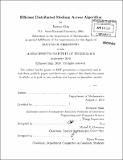| dc.contributor.advisor | Devavrat Shah. | en_US |
| dc.contributor.author | Shin, Jinwoo | en_US |
| dc.contributor.other | Massachusetts Institute of Technology. Dept. of Mathematics. | en_US |
| dc.date.accessioned | 2011-06-20T15:58:58Z | |
| dc.date.available | 2011-06-20T15:58:58Z | |
| dc.date.copyright | 2010 | en_US |
| dc.date.issued | 2010 | en_US |
| dc.identifier.uri | http://hdl.handle.net/1721.1/64604 | |
| dc.description | Thesis (Ph. D.)--Massachusetts Institute of Technology, Dept. of Mathematics, 2010. | en_US |
| dc.description | Cataloged from PDF version of thesis. | en_US |
| dc.description | Includes bibliographical references (p. 153-157). | en_US |
| dc.description.abstract | Allocation or scheduling of resources among various entities contending for their access is one of the fundamental problem in engineering and operations research. To design a large, scalable networked systems, scheduling algorithms are required to be computationally very simple and distributed (or message passing). In this thesis, we present a novel method to design performance optimal, simple and distributed algorithms for a variety of scheduling problems. The algorithmic method is explained in detail in the context of wireless medium access. However, it naturally extends to essentially any instance of stochastic processing network (cf. [23]). In a wireless network, multiple transmitters are attempting to utilize common wireless medium for the purpose of communication. Due to nature of wireless communication, two simultaneous transmissions may interfere with each other. To avoid such destructive interference, a scheduling algorithm, known as medium access control (MAC), is required. The question of (design efficient MAC has been extensively studied starting with the ALOHA network [1]. Although certain types of MAC algorithms are used in practice (e.g. those confirming to IEEE 802.11)., a provably performance efficient algorithm has remained mystery for more than four decades. As an important contribution of this thesis, we resolve this challenge by presenting a novel, randomized medium access control (MAC) that is provably performance optimal. Like the solutions utilized in practice, it is a "randomized" or "back-off-like" algorithm and uses "carrier sense" information. This is the first instance of MAC that is proven to be performance optimal for general interference topology. Our solution blends the classical Metropolis-Hastings sampling mechanism with insights obtained from analysis of time-varying queueing dynamics. Methodically, our theoretical framework is applicable to design of efficient distributed scheduling algorithms for a wide class of combinatorial resource allocation problem in stochastic processing networks, including scheduling in input-queued switches and optical core network. | en_US |
| dc.description.statementofresponsibility | by Jinwoo Shin. | en_US |
| dc.format.extent | 157 p. | en_US |
| dc.language.iso | eng | en_US |
| dc.publisher | Massachusetts Institute of Technology | en_US |
| dc.rights | M.I.T. theses are protected by
copyright. They may be viewed from this source for any purpose, but
reproduction or distribution in any format is prohibited without written
permission. See provided URL for inquiries about permission. | en_US |
| dc.rights.uri | http://dspace.mit.edu/handle/1721.1/7582 | en_US |
| dc.subject | Mathematics. | en_US |
| dc.title | Efficient distributed medium access algorithm | en_US |
| dc.type | Thesis | en_US |
| dc.description.degree | Ph.D. | en_US |
| dc.contributor.department | Massachusetts Institute of Technology. Department of Mathematics | |
| dc.identifier.oclc | 727146241 | en_US |

